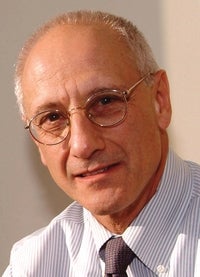As the nation inches closer to major health care reforms, eyes are definitely on the Bay State and its landmark health care reform.
And, at least according to a recent annual report from the Health Insurance Connector Authority, the prognosis is good.
“I think the state is leading the nation,” said Jon Kingsdale, executive director of the so-called Health Connector, an independent authority that was established under the state’s health reform legislation in 2006 to help residents meet the law’s requirement that all residents have health insurance.
The Health Connector’s report shows that while the state’s unemployment rate jumped from 5.1 percent in June 2008 to 7.7 percent in March 2009, the number of uninsured residents in the state climbed only slightly, inching up from 2.6 percent in mid-2008 to 2.7 percent in 2009.
“I was surprised, to be perfectly honest with you,” Kingsdale said of the miniscule increase. “I expected it to go up more.”
That’s good news for Massachusetts, but the future success of the state’s health care reforms hinges on controlling costs, which Kingsdale said is so daunting, it prevents him from being optimistic that the state can do enough to keep the reforms successful.
He said he’s hopeful that the state can find a way to control health care spending and is encouraged by the level of commitment out there to see it through, but he’s taking a cautious approach to projecting future success.
“I want to be a realist,” he said. “We haven’t done the legislation yet, and there’s probably nothing politically more challenging than health care cost containment.
Fluctuating Support
Despite Kingsdale’s upbeat outlook, Massachusetts has gotten a bad rap from some media outlets, which have used the Bay State as a “what not to do” guide on health care reform. In particular, the Wall Street Journal has editorialized that the Bay State has an uncontainable system that will only continue to be a burden on taxpayers.
Not surprisingly, the Health Connector’s report paints a much rosier picture, while acknowledging some dwindling public support. The report cited a survey that found 61 percent of residents supported health care reform in 2006. That number dropped to 59 percent September of this year.
Despite the drop, Kingsdale doesn’t see it as reason for concern — at least not yet.
“It would (be a concern) if I thought that it was the beginning of a downward trend,” he said.
Instead, the Health Connector’s executive director, who previously served as a senior executive at Tufts Health Plans for almost two decades, believes that the decrease simply is a reflection of the recession and the timing in which the survey was conducted. He said that the survey followed a month of town hall meetings and the circulation of “misleading factual information” concerning the state’s reforms.
Approval rates for the state’s health care reform next year will be more indicative of the need for concern, he said.
The Health Connector’s report also details enrollment in Commonwealth Care, the state’s low-cost or no-cost insurance plan. As of March 31, there were 165,000 enrollees in Commonwealth Care, down from 176,000 as of June 30, 2008.
According to Kingsdale, what is a pressing concern is to constrain rising health care costs.
He said that if the state can find a way to reduce health care spending over the next few years, there will be no going back.
“It’s no longer an experiment,” he said of the state’s pursuit of health care reform. “We have weathered the biggest recession in the country’s history since the 1930s and the commitment remains very vibrant and robust.”
The only possible deterrent to the continued success of the state’s health care reform is the escalating costs for health care coverage — and Kingsdale said that will be the hardest obstacle to overcome.
“We’re not talking about cutting costs but reducing the increase of costs,” he said. “But health care costs are somebody’s revenue, so in some ways we’re talking about slowing revenues and that’s challenging.”
To succeed, Kingsdale believes Massachusetts will need to “forge new pathways” and be willing to consider partnerships and alliances that were previously ignored or overlooked. He said aligning employers and consumers is one way to put pressure on those determining health care costs and is an example of the kind of shift in thinking that will be necessary to succeed.
“There are a dozen different ways to contain health care costs and positively impact health care spending,” he said. “What we lack is the political strategy.”

